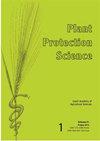Ecofriendly Approaches for Controlling Mustard Aphid (Lipaphis erysimi Kalt.) Infestation
IF 1.7
4区 农林科学
Q2 AGRONOMY
引用次数: 0
Abstract
Brassica oilseed crops are grown all over the world, but the aphids of cabbage, Brevicoryne brassicae L. and Turnip aphid Lipaphis erysimi Kalt, cause mischief to the crops everywhere in the world. A field experiment was conducted at the Agricultural Farm Area of Airport Campus of Ghazi University Dera Ghazi Khan during mid-November 2019 to test eco-friendly management methods for mustard aphids. The experiment was laid out in a randomized complete block design with three replications and five treatments in 2 m ×2.7 m size plots. Seeds of the Khanpur Raya variety were sown in mid-November 2019. The treatments included (i) Neem leaf extract, (ii) Dimethoate, (iii) Lemongrass oil, (iv) Mustard Cake, and (v) Control (untreated). The overall results of the experiment showed that after the second spray, the aphids became immune to synthetic pesticides. However, bio-pesticides had some control over the aphids, with Lemongrass oil producing the best results, achieving almost 80 percent control, followed by about 72 percent control with neem extract and almost 67 percent control with mustard cake. This suggests that Lemongrass oil can be used to control aphids on mustard plants and, since it is a bio-pesticide, it has many biological benefits. Therefore, it can be concluded that using botanical products for managing mustard aphids can be an effective and eco-friendly approach芥菜蚜虫的生态防治方法侵扰
油菜属油料作物在世界各地都有种植,但白菜蚜虫Brevicoryne brassicae L.和萝卜蚜虫Lipaphis erysimi Kalt在世界各地都对作物造成危害。2019年11月中旬,在加齐大学德拉加齐汗机场校区的农场区进行了一项田间试验,以测试芥菜蚜虫的环保管理方法。试验采用完全随机区组设计,3个重复,5个处理,面积为2 m ×2.7 m。Khanpur Raya品种的种子于2019年11月中旬播种。处理包括(i)印度楝叶提取物,(ii)乐果,(iii)柠檬草油,(iv)芥末饼,和(v)对照(未经处理)。实验的总体结果表明,在第二次喷洒后,蚜虫对合成农药产生了免疫力。然而,生物农药对蚜虫有一定的控制作用,柠檬草油的效果最好,控制了近80%,其次是楝树提取物,控制了约72%,芥末蛋糕控制了近67%。这表明柠檬草精油可以用来控制芥菜上的蚜虫,而且由于它是一种生物农药,它具有许多生物学上的益处。因此,利用植物产品治理芥菜蚜虫是一种有效且环保的方法
本文章由计算机程序翻译,如有差异,请以英文原文为准。
求助全文
约1分钟内获得全文
求助全文
来源期刊

Plant protection science
Agronomy-PLANT SCIENCES
CiteScore
2.90
自引率
7.70%
发文量
30
审稿时长
12 weeks
期刊介绍:
Original papers, short communications, critical reviews, personal news, and book reviews covering all areas of diseases and pests of plants, weeds and plant protection. Papers are published in English.
 求助内容:
求助内容: 应助结果提醒方式:
应助结果提醒方式:


